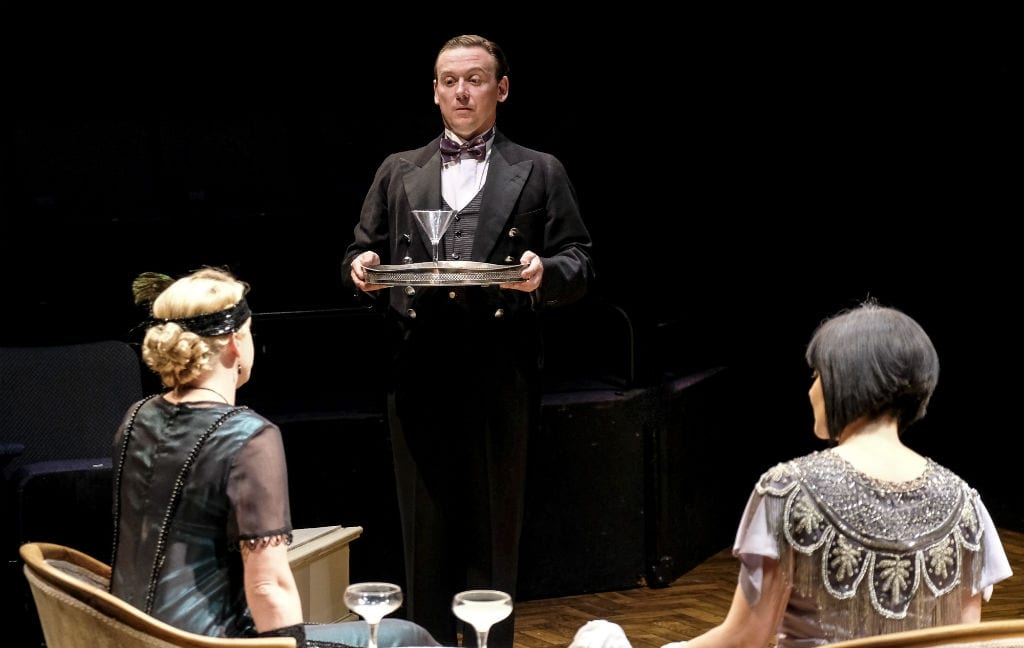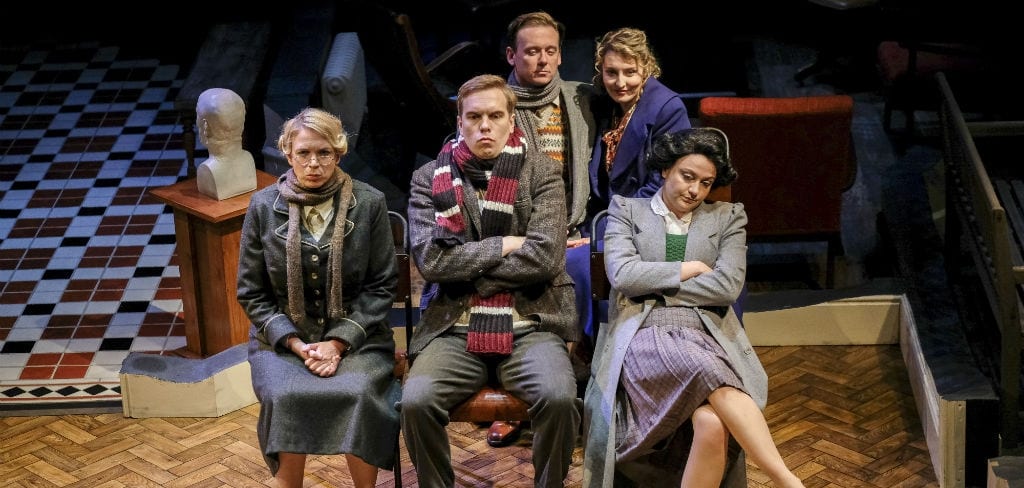Young Anthony Spates is the pivotal figure in A Brief History of Women, whose life passage is traced in four vignettes each set 20 years apart. Kirkbridge Manor, the backdrop of Spates’s life, transforms concurrently with him – out of the early 20th century, through two wars, and into the present, an elegant and often funny format of a life and place in transition.
When we first meet Spates, the year is 1925. He is a 17-year old part-time servant at a jazzy, booze-soaked engagement party that goes from an alcohol-laden affair to a destructive and vicious battle between husband and wife, and sets Spates’s life on its course. Celebrated playwright Alan Ayckbourn – who serves here as director – delivers a scathing indictment of Britain’s classist notions, the sexism and arrogance of the time. Lord Edward Kirkbridge rails against Spates and his “downstairs” status: “They expect us to treat them like bloody equals! I’ll tell you what comes next – socialism!” Women, in the lord’s view, are no better than servants. When Lord Kirkbridge and his wife ensue in a cringe-worthy verbal battle, he suggests that her daughter “ought to be put down”. She retorts, “I think you must be a queer!” (Homosexuality was a criminal offense in the UK until 1967). The pent-up anger inside this societal construct is palpable: the hostility and venom results in Lord Kirkbridge’s on-stage heart attack. Lady Kirkbridge notes to Spates that he may be the only person in the manor who is civil to her. The party breaks up and the engagement breaks apart. The lady, reclaiming her humanity, compassion, and feminist power, bestows Spates his first kiss. She urges him to university, hinting that she may have a hand in his future education.
The second act is set just after entry into World War II. Spates is a teacher at Kirkbridge Manor, now a prep school for girls. His girlfriend, Ursula, is demonstrably affectionate, but the headmaster, a Victorian carryover, cautions they are not being clandestine enough in their affairs. Class resentment is still evident, as an RAF pilot accuses Spates – the simple farmer – of a cushy life having sat out the battle in a “reserved occupation”. Sexual longing is still repressed, and Britain is “a country of missing men and emotionally distant women.” On the evening of Guy Fawkes Day – a night of fireworks – Spates suddenly discovers that Ursula is more than just impaired by grief over her lost fiancé – she might be going mad. He also discovers she’s sexually uninhibited, and as they are caught in flagrante delicto their shared humiliation ends in a flash as the fireworks ignite.

In the mid-1960s, Kirkbridge Manor again transforms, this time into an arts center. Here the wonderful versatility of the small ensemble comes into sharp focus in the play’s funniest act. Russell Dixon steals the show as the flamboyant drama director who arrives at rehearsal in an enormous bra and delivers a perversely hilarious song, which the cast also applauds. Later, the players bicker over the production of Jack and the Beanstalk, supposedly put on for the local children but reinterpreted as what could be a revolutionary work. As the world becomes more serious in an age of political awakening, the players’ charm serves as levity. In conversation with an actress, Gillian, Spates realizes things haven’t worked out quite the way he wanted it to, and that “my whole life seems to have revolved around this house.” Yet he has always been appreciated, and a few of the narrative threads from Act I are woven in here. Spates and Gillian, who have been dancing together, begin to synchronize as the lights go down.
During the final act, Kirkbridge Manor is now a refurbished and posh hotel, and Spates its retired manager stepping in when the need arises. The old study, scene of Act I’s cruel spat, is now a sun-filled room overlooking the ground’s gardens. 1980s muzak is softly piped into the hallways. A new guest arrives and Spates shows her the hotel’s ballroom where he met his wife 20 years earlier “at a sort of dance.” The guest fetches her great-grandmother, Mrs. Seabourne, the original Lady Kirkbridge, who seems not to recognize him – until she does. Ayckbourn beautifully bookends the play with the notion that moments, places, and memories are beyond the burnishes of time. Progress and change, like the women Spates encounters, soften the hard edges of his life.
The play has spectacular transitions, the stagehands cleverly updating the set to show its transformation from manor to school to arts center and finally, hotel. The ensemble, and in particular Louise Shuttleworth, are individually and collectively outstanding. A beautifully executed play by one of Britain’s leading playwrights for over 50 years, this is an experience not to be missed.

